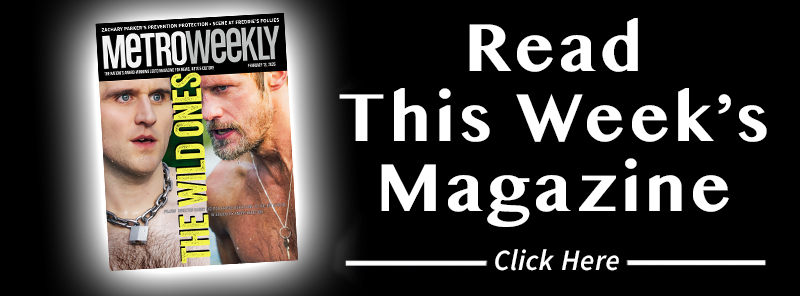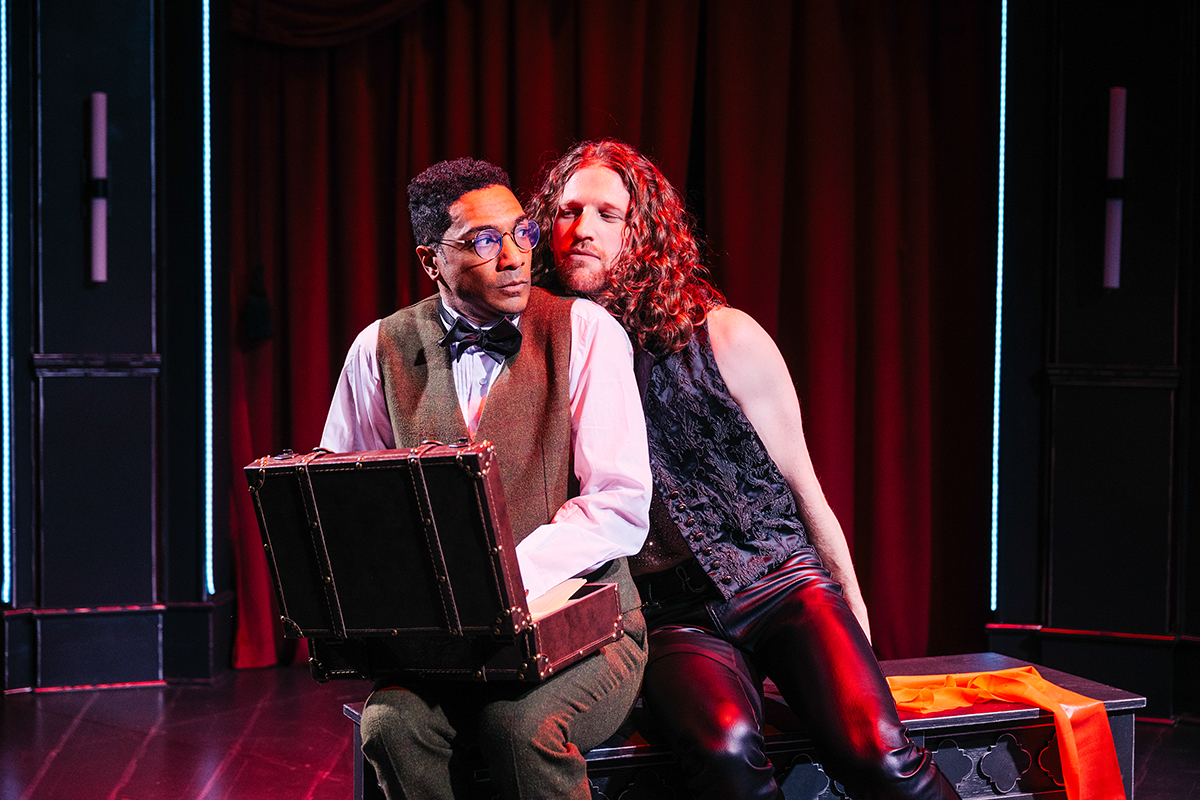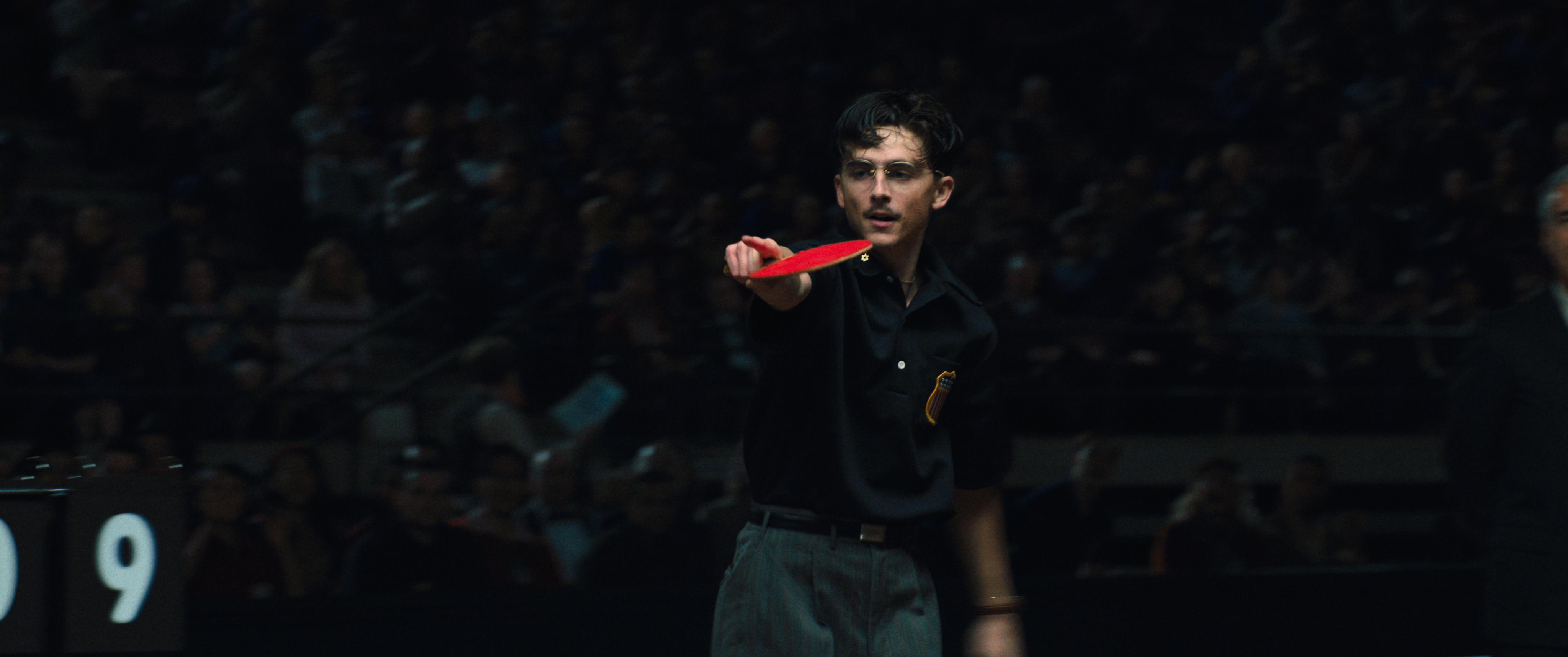Review: Hunter S. Thompson Musical Misses the Mark
Signature Theatre’s high-octane rock musical paints Hunter S. Thompson as a counterculture icon, but leans too hard on hero worship and too little on meaningful insight.
By André Hereford on June 15, 2025 @here4andre

If you don’t know or don’t recall what a big deal Hunter S. Thompson was, he’s here to tell you how big a deal he was — and why — in Signature Theatre’s The Untitled Unauthorized Hunter S. Thompson Musical, directed by Christopher Ashley.
In fiction, as he apparently was in life, the maverick writer is his own biggest fan, eager to blow his horn in this rock ‘n’ roll odyssey from Be More Chill creator Joe Iconis, who composed the music and lyrics, and co-wrote the show’s book with Gregory S. Moss. Their story takes us through Thompson’s unruly journey from middle-class kid in 1940s Louisville, Kentucky, to self-proclaimed major figure in American history, a leading voice of the ’60s counterculture movement.
An exceedingly self-aggrandizing hero — portrayed by Eric William Morris with a mischievous gleam in his eye and the genial comedic air of ’80s-era Tom Hanks — Thompson eagerly breaks the fourth wall to narrate the tale himself. He’s backed by a healthy ensemble of performers, appearing as his so-called demons, voices of his conscience and of his past, like his feisty mother, Virginia (Lorinda Lisitza).
Surrounded by his demons, Thompson sings his own praises, between snorts of dexedrine, communing with us from scenic designer Wilson Chin’s woodsy set. “We believe in freedom here,” Thompson declares. Where is here? A men’s lodge maybe, generously plastered with posters, paintings, magazine clippings, stuffed bucks, and sundry other doodads.
It’s where Thompson presides over likeminded “freaks” who deem him, as he deems himself, a hero, a rebel, a leader, and disruptor. More through song and description than via compelling dramatization, the musical tells of rather than shows Thompson’s rise as an esteemed journalist and provocateur to the heights of ’60s-’70s celebrity cool.
Few writers ever enjoy such a level of fame that might entail having fans who dress up like them in their honor. But Thompson managed to captivate his audience not just with words, but also with his style, nailing down a look — the bucket hat, printed shirts, and lemon-yellow shades — that’s still imitated today, and totally recognizable even now, twenty years since his death.
His impact as the patron saint of middle-class straight white guys who want to question authority, challenge the culture, and let their freak flag fly remains solid, if a little dated and specific. After all, if you were, say, a Black queer person living your truth in 1970, or any queer person, you already knew the liberation that Hunter S. Thompson was still discovering.
Notably, he’s asked in the show why there are no Black people in his books. “I’ve written about the Negro struggle,” he responds, sounding like a man unacquainted personally with those struggles or with many Black folks. However, he considers himself one with the struggle against injustice and oppression, and sincerely hopes to make a difference for all.
That is the matter that troubles him. He’s joined momentarily by two other brand-name authors, F. Scott Fitzgerald and Ernest Hemingway, to ponder whether he and his career have made a difference.
In the most persuasive passage, Thompson’s on a mission to bring down sworn enemy Richard Nixon (George Abud, who’s delightful) with the power of his scathing writing. But he must confront the fact that his gonzo journalism does not stop America from re-electing “fascist asshole” Nixon. His shock and dismay over America’s embrace of faux-everyman Nixon resonates sharply now.
Resonating more pleasurably is the robust sound of the full cast, supported by conductor Rick Edinger and the five-piece band. Songs like “Rich Kids,” a wise lesson from Thompson’s mama to her newborn, and “Hey Dad,” an ode to familial connection sung beautifully by Ryan Vona as Thompson’s semi-estranged son, convey struggles in his life that could not be soothed by celebrity or his drug of choice.
In those moments, prizing someone else’s point of view, we find relief from Thompson’s ego and the insistent portrayal of how big a deal he was and is, whether you believe it or not.
The Untitled Unauthorized Hunter S. Thompson Musical (★★☆☆☆) runs through July 13 at Signature Theatre, 4200 Campbell Ave., in Arlington, Va.
A Pride Night performance is on June 27, and Discussion Night performances are on June 17 and July 9. Tickets are $47 to $112. Call 703-820-9771, or visit www.sigtheatre.org.
More from Metro Weekly:
Lovell Holder Turns Reality TV Into a Queer Reckoning
His novel, The Book of Luke, blends queer romance, politics, and competition at a moment when LGBTQ readers are craving big, messy stories.
By André Hereford on January 12, 2026 @here4andre
Lovell Holder's debut novel, The Book of Luke, arrives at a precipitous moment for queer literary fiction. The heated tale of a handsome gay ex-athlete romancing a rival (or two) on a hit reality TV competition, the book seems custom-built to reach the ravenous audience that's turned the Heated Rivalry books and TV series into a phenomenon.
Of course, Holder, who's also a filmmaker, started writing The Book of Luke several years ago, with a different intention than riding the wave of a gay hockey hit.
Holder started the book, which chronicles the life and reality TV adventures of Luke Griffin, the soon-to-be ex-husband of a gay Republican U.S. Senator, in 2019. "I was really interested, at that time, in the idea of complicity and how underrepresented communities can sometimes oppress members of other underrepresented communities," he says.
Dracula: A Comedy of Terrors Is Campy Fun at Constellation
Constellation Theatre Company’s boisterous spoof of Bram Stoker’s gothic classic leans into parody, sex jokes, and era-mashing silliness.
By André Hereford on February 7, 2026 @here4andre
Constellation conducts some wickedly funny business with Dracula: A Comedy of Terrors, Gordon Greenberg and Steve Rosen's screwball spoof of Bram Stoker's gothic horror tale. Zingy and zany, Nick Martin's production is maybe not as sidesplittingly hilarious as the company's friends in the house on opening night might have you believe, but it's still damn funny.
True to the chilling atmosphere of the novel, the play begins with a warning to intrepid hero Jonathan Harker (Sentell Harper) that nothing "but death, destruction, and evil" awaits inside the castle of Count Dracula. Of course, in this comic spin, what actually awaits are Mel Brooksian parody, sexed-up silliness, and blood-sucking shenanigans presided over by a louche, leather-clad Count looking for love.
Marty Supreme Runs on Timothée Chalamet’s Pure Mania
Josh Safdie’s solo outing turns table tennis into a nerve-shredding portrait of ambition, ego, and postwar anxiety.
By Zach Schonfeld on January 4, 2026
Let me start with a nitpick: Marty Supreme is not, as commonly reported, Josh Safdie's solo directorial debut. That would be The Pleasure of Being Robbed, a modest, mumblecore-era gem released in 2008, long before Josh and brother Benny became known for directing white-knuckle crime thrillers like Good Time (2017) and Uncut Gems (2019). Made on a shoestring budget with a cast of unknowns, Pleasure followed the misadventures of a young kleptomaniac (Eleonore Hendricks) in Bloomberg-era New York. Few saw it in 2008, but those who did sensed a budding talent.
Support Metro Weekly’s Journalism
These are challenging times for news organizations. And yet it’s crucial we stay active and provide vital resources and information to both our local readers and the world. So won’t you please take a moment and consider supporting Metro Weekly with a membership? For as little as $5 a month, you can help ensure Metro Weekly magazine and MetroWeekly.com remain free, viable resources as we provide the best, most diverse, culturally-resonant LGBTQ coverage in both the D.C. region and around the world. Memberships come with exclusive perks and discounts, your own personal digital delivery of each week’s magazine (and an archive), access to our Member's Lounge when it launches this fall, and exclusive members-only items like Metro Weekly Membership Mugs and Tote Bags! Check out all our membership levels here and please join us today!
The Magazine
-
Most Popular
 Ronté Pierce Leads GMCW’s Heart & Soul Celebration
Ronté Pierce Leads GMCW’s Heart & Soul Celebration  LGBTQ U.S. Athletes Strike Gold at Milano Cortina
LGBTQ U.S. Athletes Strike Gold at Milano Cortina  Harry Lighton Talks Kink, Romance, and Leather in Pillion
Harry Lighton Talks Kink, Romance, and Leather in Pillion  GALA’s House of Bernarda Alba Is Ruthless and Riveting
GALA’s House of Bernarda Alba Is Ruthless and Riveting  Keegan’s John Doe Is a Promising Ghost Story That Falters
Keegan’s John Doe Is a Promising Ghost Story That Falters  Pitchers’ Dave Perruzza on Selling, Survival, and What’s Next
Pitchers’ Dave Perruzza on Selling, Survival, and What’s Next  Chicago-Area Teen Used Sniffies to Lure and Rob Uber Driver
Chicago-Area Teen Used Sniffies to Lure and Rob Uber Driver  Stereophonic Is Rock Drama at Full Volume
Stereophonic Is Rock Drama at Full Volume  Win a Watches Scarf from Hillwood Museum
Win a Watches Scarf from Hillwood Museum  Win Tickets to Orville Peck at Wolf Trap
Win Tickets to Orville Peck at Wolf Trap
 Ronté Pierce Leads GMCW’s Heart & Soul Celebration
Ronté Pierce Leads GMCW’s Heart & Soul Celebration  Win a Watches Scarf from Hillwood Museum
Win a Watches Scarf from Hillwood Museum  Harry Lighton Talks Kink, Romance, and Leather in Pillion
Harry Lighton Talks Kink, Romance, and Leather in Pillion  Stereophonic Is Rock Drama at Full Volume
Stereophonic Is Rock Drama at Full Volume  GALA’s House of Bernarda Alba Is Ruthless and Riveting
GALA’s House of Bernarda Alba Is Ruthless and Riveting  LGBTQ U.S. Athletes Strike Gold at Milano Cortina
LGBTQ U.S. Athletes Strike Gold at Milano Cortina  Keegan’s John Doe Is a Promising Ghost Story That Falters
Keegan’s John Doe Is a Promising Ghost Story That Falters  Win Tickets to The National Philharmonic
Win Tickets to The National Philharmonic  Trump Administration Removes Pride Flag at Stonewall
Trump Administration Removes Pride Flag at Stonewall  Win Tickets to Orville Peck at Wolf Trap
Win Tickets to Orville Peck at Wolf Trap
Scene
Metro Weekly
Washington's LGBTQ Magazine
P.O. Box 11559
Washington, DC 20008 (202) 527-9624
About Us pageFollow Us:
· Facebook
· Twitter
· Flipboard
· YouTube
· Instagram
· RSS News | RSS SceneArchives
Copyright ©2025 Jansi LLC.
















You must be logged in to post a comment.